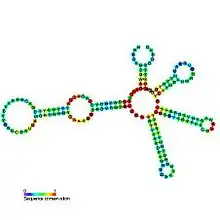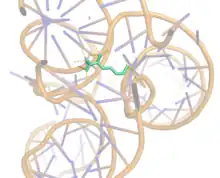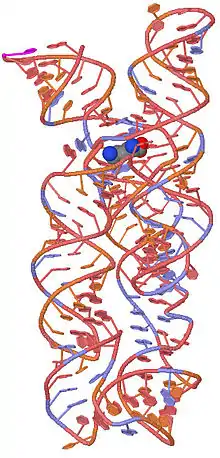Lysine riboswitch
The Lysine riboswitch is a metabolite binding RNA element found within certain messenger RNAs that serve as a precision sensor for the amino acid lysine. Allosteric rearrangement of mRNA structure is mediated by ligand binding, and this results in modulation of gene expression.[1] Lysine riboswitch are most abundant in Bacillota and Gammaproteobacteria where they are found upstream of a number of genes involved in lysine biosynthesis, transport and catabolism.[2][3][4] The lysine riboswitch has also been identified independently and called the L box.[5]
| Lysine riboswitch | |
|---|---|
 Predicted secondary structure and sequence conservation of Lysine riboswitch | |
| Identifiers | |
| Symbol | Lysine |
| Rfam | RF00168 |
| Other data | |
| RNA type | Cis-reg; riboswitch |
| Domain(s) | Bacteria |
| SO | SO:0000035 |
| PDB structures | PDBe |

The lysine riboswitch controls metabolic pathways of lysine biosynthesis. In particular the metabolic flux of the tricarboxylic acid (TCA) cycle is effectively controlled by the riboswitch.[6] Controlling metabolic flux is imperative for the development of microorganisms in cell growth, and the use of the lysine riboswitch in its applicable bacterium allows for the use of more effective strategies to accomplish control. It is more effective in comparison to various expensive and difficult methods such as utilizing a gene knockout. With lysine as an intracellular signal, the riboswitch regulates gene expression in response to specific metabolites. The lysine riboswitch was first investigated in Bacilus subtilis, located at the 5’UTR of the lysC gene coding for aspartkinase. It has since been found in E.coli (ECRS) with the ability to inhibit translation of apsrtkinase III in E.coli and accelerate mRNA decay.[7] In both E.Coli and Bacilus subtilis, the lysine riboswitch controls the production of citrate synthase, and therefore metabolic flux in the TCA cycle as decreases in citrate synthase activity contributes to increases in lysine production. Control of TCA cycle activity thus affects the biosynthesis of lysine indicating a higher metabolic flux into the lysine synthesis pathway. [7]It has no inhibitory effect on transcription except for in Bacilus subtilis. The ligand binding domain of the riboswitch binds to L Lysine.
Structure
The structure of the lysine riboswitch has recently been determined.[8][9] The lysine amino acid is bound in the pocket formed by the 5-way junction. The structure is composed of a three helical bundle and a two helical bundle joined by the 5-way junction. Helices 1 and 2 are stacked in a colinear fashion as are helices 4 and 5.
 A 3D representation of the lysine riboswitch with a bound lysine molecule shown in space filling spheres.[8]
A 3D representation of the lysine riboswitch with a bound lysine molecule shown in space filling spheres.[8]
References
- Mandal, M; Boese B; Barrick JE; Winkler WC; Breaker RR (2003). "Riboswitches Control Fundamental Biochemical Pathways in Bacillus subtilis and Other Bacteria". Cell. 113 (5): 577–586. doi:10.1016/S0092-8674(03)00391-X. PMID 12787499. S2CID 8012149.
- Sudarsan, N; Wickiser JK; Nakamura S; Ebert MS; Breaker RR (2003). "An mRNA structure in bacteria that controls gene expression by binding lysine". Genes Dev. 17 (21): 2688–2697. doi:10.1101/gad.1140003. PMC 280618. PMID 14597663.
- Rodionov, DA; Vitreschak AG; Mironov AA; Gelfand MS (2003). "Regulation of lysine biosynthesis and transport genes in bacteria: yet another RNA riboswitch?". Nucleic Acids Res. 31 (23): 6748–6757. doi:10.1093/nar/gkg900. PMC 290268. PMID 14627808.
- Mukherjee, S; Barash D; Sengupta S (2017). "Comparative genomics and phylogenomic analyses of lysine riboswitch distributions in bacteria". PLOS ONE. 12 (9): e0184314. doi:10.1371/journal.pone.0184314. PMC 5584792. PMID 28873470.
- Grundy, FJ; Lehman SC; Henkin TM (2003). "The L box regulon: Lysine sensing by leader RNAs of bacterial lysine biosynthesis genes". Proc Natl Acad Sci USA. 100 (21): 12057–12062. doi:10.1073/pnas.2133705100. PMC 218712. PMID 14523230.
- Sudarsan, Narasimhan; Wickiser, J. Kenneth; Nakamura, Shingo; Ebert, Margaret S.; Breaker, Ronald R. (2003-11-01). "An mRNA structure in bacteria that controls gene expression by binding lysine". Genes & Development. 17 (21): 2688–2697. doi:10.1101/gad.1140003. ISSN 0890-9369. PMC 280618.
- Zhou, Li-Bang; Zeng, An-Ping (2015-06-19). "Exploring Lysine Riboswitch for Metabolic Flux Control and Improvement of l -Lysine Synthesis in Corynebacterium glutamicum". ACS Synthetic Biology. 4 (6): 729–734. doi:10.1021/sb500332c. ISSN 2161-5063.
- Serganov A, Huang L, Patel DJ (2008). "Structural insights into amino acid binding and gene control by a lysine riboswitch". Nature. 455 (7217): 1263–1267. doi:10.1038/nature07326. PMC 3726722. PMID 18784651.
- Garst AD, Héroux A, Rambo RP, Batey RT (August 2008). "Crystal structure of the lysine riboswitch regulatory mRNA element". The Journal of Biological Chemistry. 283 (33): 22347–22351. doi:10.1074/jbc.C800120200. PMC 2504901. PMID 18593706.